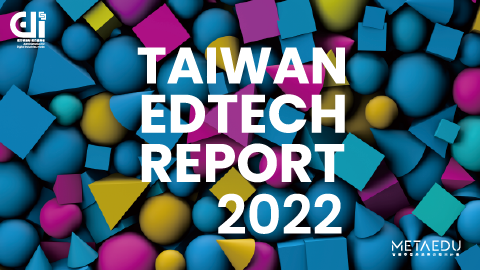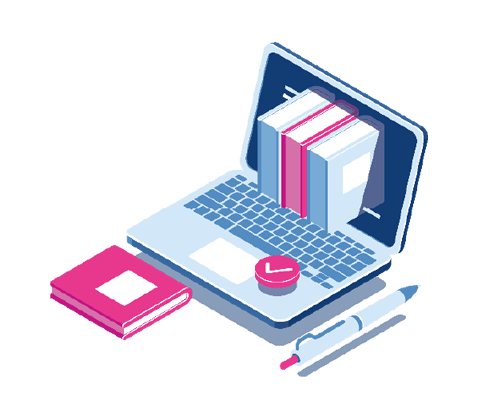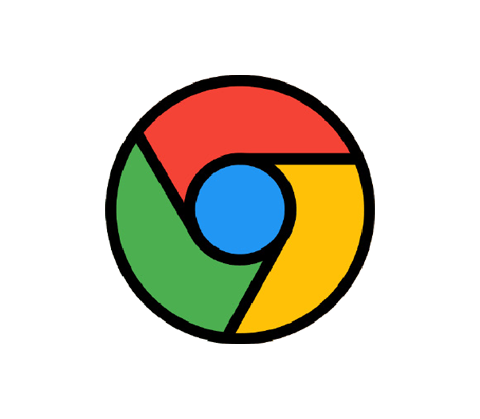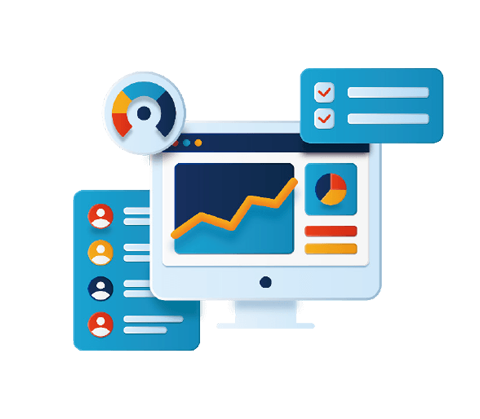

The total output value of Taiwan's EdTech industry in 2022 has reached TWD 576.29 billion, with the overall output value growth rate refreshing a new high driven by the opportunities brought by the distance learning due to the pandemic. Compared with last year, the YoY growth rate reached 25.9%, with instructional hardware accounting for more than 80%; the value of instructional content accounted for 10%, and the YoY growth rate was the most obvious, reaching 51.4%, mainly due to the urgent need for distance learning, which resulted in a change in demand for campus-end products; the proportion of software systems was 6.6%, and the YoY growth rate reached 19.7%, highlighting the continued critical role played by Taiwan in the global ICT supply chain during the pandemic.
The "HolonIQ 2022 Taiwan EdTech 50" competition, jointly organized by the Administration of Digital Industries, Ministry of Digital Affairs, the Institute for Information Industry (III), and HolonIQ, the world's largest technology education research institution, has once again selected outstanding educational technology companies representing Taiwan this year. The list of selected companies has surpassed last year's performance, with a total of 18 Taiwanese companies selected for the "HolonIQ EastAsia EdTech 150".
The METAEDU Program continues to promote excellent products/solutions to the global education market, make good use of technology, solve digital gaps, and achieve the goal of educational equality.
The "HolonIQ 2022 Taiwan EdTech 50" competition, jointly organized by the Administration of Digital Industries, Ministry of Digital Affairs, the Institute for Information Industry (III), and HolonIQ, the world's largest technology education research institution, has once again selected outstanding educational technology companies representing Taiwan this year. The list of selected companies has surpassed last year's performance, with a total of 18 Taiwanese companies selected for the "HolonIQ EastAsia EdTech 150".
The METAEDU Program continues to promote excellent products/solutions to the global education market, make good use of technology, solve digital gaps, and achieve the goal of educational equality.



Instructional Content up 50% YoY
Due to the COVID-19 pandemic, remote learning became urgent and the demand for educational products shifted to web-based digital content, purely electronic textbooks, and self-directed digital learning materials, increasing the need for digital content.



Chromebook Drives Instructional Hardware Growth
With the easing of the pandemic's impact and the completion of educational projects, demand for Chromebooks will decrease. Future growth in educational hardware production is expected to slow down, and overall production value will return to pre-pandemic levels.



Integrated Platforms Need Significant
Improvement in Blended Learning Mode.
Improvement in Blended Learning Mode.
To adapt to blended learning, the school is replacing its old platform and adding cloud services to increase capacity. They’re also introducing data analysis to evaluate student performance and teacher quality. To address online teaching challenges, they’re developing digital teaching materials and a shared database of teaching resources.


According to this survey, the main vertical markets for Taiwan’s EdTech business in 2022 are “K-12 “ (34%) and “Enterprise Services” (27%). Enterprise services are divided into “providing enterprise internal training courses and projects (content services)” (18%), “enterprise software services” (6%), and “enterprise hardware services” (3%). It can be seen that companies mainly focus on K-12 education and enterprise as their main target groups. Compared with 2021, there is no significant difference in the results


According to the 2022 survey, the sales customer types and percentages of the EdTech industry in Taiwan are ranked as follows: “Enterprise” (33%), “School” (28%), “Individual” (23%), “Cram School” (8%), and “Government Agency” (7%).


Instructional Content |
Digital Learning Digital learning includes the design of teaching materials and digital knowledge transfer services. The design of teaching materials refers to the development of digital teaching materials and courses for users to use on various devices such as desktop computers, laptops, smartphones, and tablets. Digital knowledge transfer services provide various subject teaching and training services through online on-demand or live broadcasting, allowing users to learn anytime, anywhere on multiple devices. Instructional content can be divided into teaching content for subjects such as English, Mandarin, IT, management, industry, games, healthcare, textbooks, and corporate training courses, as well as for different age groups such as preschool, K-12 education, higher education, vocational education, and lifelong education. Instructional content can also be classified according to product types such as e-books, MOOCs courses, instructional videos, AR/VR games or videos, online live teaching, online tutoring services, etc. Technology Education Services With the evolution of smart education and the global STEAM education trend, the scope of smart education has expanded beyond online learning services to include offline STEAM-related technology education and training services. The technology education services referred to in this study scope provide physical technology education and related teaching and training services for children or adults, including science summer camps, programming language courses, and Maker courses, among others. |
Software Systems |
Integrated Platforms Integrated platforms provide a single, comprehensive resource system for learners, teachers, and educational institutions to use for teaching, including learning management systems (LMS, LCMS), instructional live broadcasting platforms, instructional matching platforms, instructional community platforms, or platforms that provide administrative management services for education, such as campus administrative systems, library management systems, payroll management systems, official document management systems, campus health management systems, parent-teacher-student platforms, etc. Tool Systems Tool systems provide various digital solutions, licensed software, or technical solutions for digitizing various instructional content without directly facing end-use learners. These include production tools, platform construction systems, application production systems and tools, big data analysis, video collaboration software, and more. |
Instructional Hardware |
Information Equipment This category includes various technological information equipment in the learning space, such as front projection systems, rear projection systems, virtual electronic whiteboards, interactive televisions for teaching, electronic book bags, real object cameras, e-book readers, learning machines, optical recognition pens, learning laptops, learning game consoles, learning tool simulators, as well as wired and wireless network equipment, system servers, and terminal hardware with access to systems (personal computers, smartphones, etc.). It also includes innovative technology education materials such as STEAM course toys and teaching aids, as well as integrated solutions. Basic Equipment Basic equipment refers to the supporting systems or hardware devices of the core products and services in the smart education field. By building a high-quality digital infrastructure, it not only provides a better application environment for smart learning products or services but also helps to construct a complete smart campus solution. It can be divided into three subcategories: smart network, smart supervision, and smart green energy. |
Instructional Content |
| Digital Learning Digital learning includes the design of teaching materials and digital knowledge transfer services. The design of teaching materials refers to the development of digital teaching materials and courses for users to use on various devices such as desktop computers, laptops, smartphones, and tablets. Digital knowledge transfer services provide various subject teaching and training services through online on-demand or live broadcasting, allowing users to learn anytime, anywhere on multiple devices. Instructional content can be divided into teaching content for subjects such as English, Mandarin, IT, management, industry, games, healthcare, textbooks, and corporate training courses, as well as for different age groups such as preschool, K-12 education, higher education, vocational education, and lifelong education. Instructional content can also be classified according to product types such as e-books, MOOCs courses, instructional videos, AR/VR games or videos, online live teaching, online tutoring services, etc. Technology Education Services With the evolution of smart education and the global STEAM education trend, the scope of smart education has expanded beyond online learning services to include offline STEAM-related technology education and training services. The technology education services referred to in this study scope provide physical technology education and related teaching and training services for children or adults, including science summer camps, programming language courses, and Maker courses, among others. |
Software Systems |
| Integrated Platforms Integrated platforms provide a single, comprehensive resource system for learners, teachers, and educational institutions to use for teaching, including learning management systems (LMS, LCMS), instructional live broadcasting platforms, instructional matching platforms, instructional community platforms, or platforms that provide administrative management services for education, such as campus administrative systems, library management systems, payroll management systems, official document management systems, campus health management systems, parent-teacher-student platforms, etc. Tool Systems Tool systems provide various digital solutions, licensed software, or technical solutions for digitizing various instructional content without directly facing end-use learners. These include production tools, platform construction systems, application production systems and tools, big data analysis, video collaboration software, and more. |
Instructional Hardware |
| Information Equipment This category includes various technological information equipment in the learning space, such as front projection systems, rear projection systems, virtual electronic whiteboards, interactive televisions for teaching, electronic book bags, real object cameras, e-book readers, learning machines, optical recognition pens, learning laptops, learning game consoles, learning tool simulators, as well as wired and wireless network equipment, system servers, and terminal hardware with access to systems (personal computers, smartphones, etc.). It also includes innovative technology education materials such as STEAM course toys and teaching aids, as well as integrated solutions. Basic Equipment Basic equipment refers to the supporting systems or hardware devices of the core products and services in the smart education field. By building a high-quality digital infrastructure, it not only provides a better application environment for smart learning products or services but also helps to construct a complete smart campus solution. It can be divided into three subcategories: smart network, smart supervision, and smart green energy. |